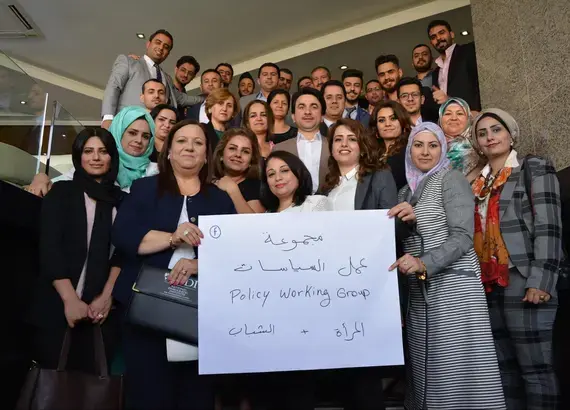
Success Story
Iraqi Political Party Activists Work Together to Forge National Reconciliation
Forty-four young activists from across Iraq’s political landscape have joined together to craft policy solutions to address the pressing concerns of the country’s marginalized communities. Comprised of women, youth, and minority representatives from 10 political parties and five civil society organizations, the 44 activists mirror Iraq’s complex sectarian landscape.
“With so many pressing political, security, and humanitarian challenges, the voices of Iraq’s marginalized communities are often not heard,” NDI’s Iraq Country Director, Ancuta Hansen, explained. “Empowering politically-minded youth from within these very communities can fill this void and help pave the way for national reconciliation.
NDI launched its “cross-party working group” initiative in Erbil on October 27th, convening the participants for a three-day joint plenary session. Members were introduced to a range of topics and skills they will employ in the coming year as they identify shared issues of concern, craft policy solutions, and engage with decision-makers.
“With this initiative, we are showing to the world that the new Iraqi generation has come together to work as one,” a Baghdad-based participant noted. “This was exactly the right moment to form these working groups,” another added. “We are jointly developing ideas and discussing solutions to people’s problems.”
With coaching from NDI, the participants reached consensus on six priority issues that the marginalized communities are facing, including:
- countering violent extremism;
- reforming the national educational curriculum to promote greater tolerance;
- stimulating the local farmers;
- providing fair access to job opportunities to graduates;
- establishing a corruption hotline; and
- improving connectivity between the government and the minority populations in rural and remote areas.
By the conclusion of the workshop, participants formed six thematic policy groups to work on each of these six issues. “We were able to find common points on small scale solutions,” a Kurdish participant said. “That is how [reconciliation] is going to happen --step by step, slowly. This brings us closer to consensus on the bigger issues,” he added.
![Yezidi woman: “The value [from my participation in this initiative] is my personal happiness. I want to thank all the other women I met here for their openness and tolerance. I feel that I am accepted… they embraced me. I’ve participate](/sites/default/files/styles/max_1300x1300/public/image00_1.jpg?itok=DM0lE-E5)
Yezidi woman: “The value [from my participation in this initiative] is my personal happiness. I want to thank all the other women I met here for their openness and tolerance. I feel that I am accepted… they embraced me. I’ve participated in other training sessions but I’ve faced obstacles in communicating with the other participants. Here, it’s easy.”
This month, the six thematic groups will start reaching out to constituents to further develop policy options. The working groups will ultimately present their policy recommendations to key decision-makers in political parties, parliament and the government and have elements of their proposal integrated into election platforms and legislative initiatives ahead of the 2017 elections.
“The formation of these working groups would not have been possible without buy-in from senior party leadership across the board,” Political Party Director Ognian Boyadjiev commented. “In many ways, it represents the culmination of NDI’s programming on policy development, citizen outreach, and national reconciliation over the past two years.”
As these young Iraqi activists continue to put their differences aside to collaborate on shared priorities, they offer a note of optimism for Iraq’s future. “I feel excited,” a working group member explained, “because I am contributing as a young person to national reconciliation.” Another participant quickly added: “This training planted the seed for mutual understanding. That’s what we need for the future -- unbiased cooperation between people from different parties.”
This program is implemented with funding support from the U.S. Department of State’s Bureau of Democracy, Human Rights, and Labor.
Published on November 21, 2016



